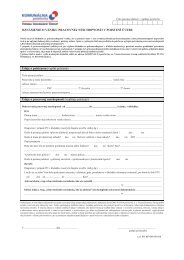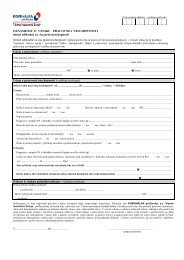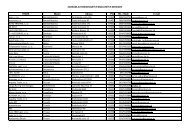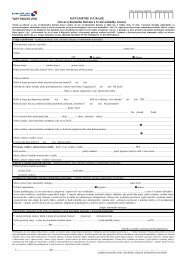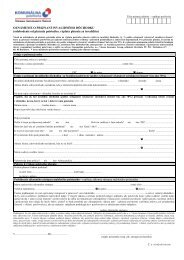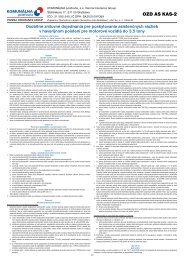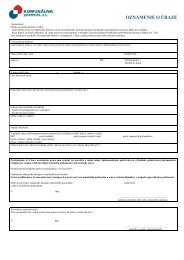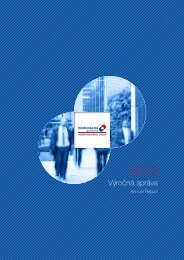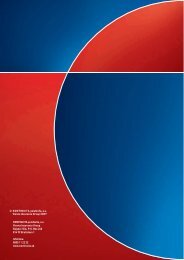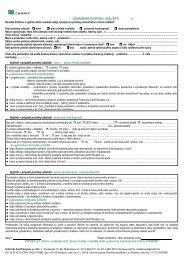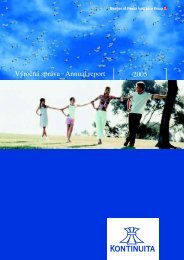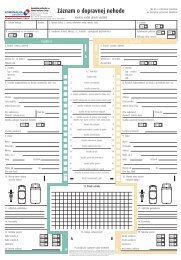(Všetky údaje su v tisícoch eur, pokiaľ nie je uvedené inak.)Spoločnosť dobrovoľne predčasne neaplikovala nové štandardy, zmeny štandardova interpretácie, ktoré budú pre Spoločnosť povinné pre účtovné obdobia začínajúce 1. januára2010 alebo neskôr:IFRIC 12, Koncesie na poskytovanie služieb (účinná pre účtovné obdobia začínajúce po 30.marci <strong>2009</strong>, s povolenou predčasnou aplikáciou ). IFRIC 12 platí pre zmluvy s verejným sektoromsúvisiace s rozvojom, financovaním a údržbou infraštruktúry. Spoločnosť neposkytuje službyverejnému sektoru na základe koncesie a táto interpretácia preto nebude mať vplyv na účtovnúzávierku Spoločnosti. IFRIC 12 bol schválený Európskou úniou v marci 2008.IAS 27, Konsolidovaná a účtovná závierka (štandard novelizovaný v januári 2008; novelaúčinná pre ročné účtovné obdobia začínajúce po 1. júli <strong>2009</strong>). Novelizovaný štandard IAS 27 budevyžadovať, aby spoločnosť priradila celkový zisk alebo stratu vlastníkom materskej spoločnostia vlastníkom podielov bez kontrolného vplyvu (predtým označovaných ako „menšinové podiely“)aj v prípade, že v dôsledku toho bude zostatok podielov vlastníkov bez kontrolného vplyvunegatívny (súčasný štandard vyžaduje, aby sa straty presahujúce podiel na vlastnom imaní voväčšine prípadov priradili vlastníkom materskej spoločnosti). Novelizovaný štandard ďalej uvádza,že zmeny vlastníckych podielov materskej spoločnosti v dcérskych spoločnostiach, v dôsledkuktorých nedôjde ku strate kontroly, sa musia zaúčtovať ako transakcie vo vlastnom imaní. Takistošpecifikuje spôsob, akým spoločnosť stanoví zisky resp. straty vyplývajúce zo straty kontrolyv dcérskej spoločnosti. K dátumu straty kontroly sa každá investícia ponechaná v bývalej dcérskejspoločnosti bude musieť oceniť v reálnej hodnote. Spoločnosť v súčasnosti posudzuje, aký dopadbude mať novelizovaný štandard na jej účtovnú závierku. Novela štandardu bola schválená EurópskouÚniou v januári <strong>2009</strong>.<strong>Výročná</strong> <strong>správa</strong> <strong>2009</strong> I Annual Report <strong>2009</strong> KOMUNÁLNA poisťovňa a.s., Vienna Insurance Group104IFRS 3, Podnikové kombinácie (štandard novelizovaný v januári 2008; novela účinná pre podnikovékombinácie, u ktorých je dátum akvizície na alebo po začiatku prvého účtovného obdobia,ktoré začína po 1. júli <strong>2009</strong>). Novelizovaný štandard IFRS 3 umožní spoločnosti zvoliť si spôsoboceňovania podielov vlastníkov bez kontrolného vplyvu buď podľa doterajšieho znenia IFRS3 (pomerným podielom na identifikovateľnom čistom majetku nadobúdanej účtovnej jednotky)alebo v reálnej hodnote. Uvádza podrobnejšie inštrukcie k aplikovaniu metódy kúpy v prípadepodnikových kombinácií. Bola zrušená požiadavka, aby sa pri výpočte príslušnej časti goodwilluoceňovala v jednotlivých krokoch postupnej akvizície každá položka majetku a záväzkov v ichreálnej hodnote. Namiesto toho sa goodwill k dátumu obstarania ocení vo výške rozdielu medzireálnou hodnotou investície v podniku ku dňu akvizície, kúpnej ceny a nadobudnutých čistýchaktív. Náklady súvisiace s akvizíciou sa budú účtovať oddelene od podnikovej kombinácie, a pretosa vykážu ako náklad, a nie ako súčasť goodwillu. Nadobúdateľ bude musieť k dátumu akvizíciezaúčtovať podmienený záväzok z obstarania iného podniku. Zmeny hodnoty tohto záväzku po dátumenadobudnutia sa vykážu v súlade s ostatnými platnými IFRS štandardmi, a nie ako úpravagoodwillu. Novelizovaný IFRS 3 sa bude vzťahovať aj na podnikové kombinácie, týkajúce sa svojpomocnýchdružstiev, a podnikové kombinácie dosiahnuté výlučne na základe zmluvného vzťahu.Spoločnosť v súčasnosti posudzuje, aký dopad bude mať novelizovaný štandard na jej účtovnúzávierku. Zmena tohto štandardu bola schválená Európskou Úniou v júni <strong>2009</strong>.Položky spĺňajúce podmienky na hedging – novela IAS 39, Finančné nástroje: Vykazovanie aoceňovanie (účinná s retrospektívnou aplikáciou pre účtovné obdobia začínajúce po 1. júli <strong>2009</strong>,s povolenou predčasnou aplikáciou). Novela objasňuje, ako sa majú v konkrétnych situáciáchaplikovať princípy, ktoré určujú, či zabezpečované riziko alebo časť peňažných tokov spĺňa podmienkyna to, aby boli označené za zabezpečené. Novela nebude mať dopad na účtovnú závierkuSpoločnosti. Zmena tohto štandardu bola schválená Európskou Úniou v septembri <strong>2009</strong>.IFRIC 17 – Nepeňažné dividendy pre majiteľov akcií a obchodných podielov (účinná pre ročnéobdobia začínajúce 1. júla <strong>2009</strong> alebo neskôr s povolenou predčasnou aplikáciou). Interpretáciaobjasňuje, kedy a ako sa má účtovať prevod nepeňažného majetku formou dividend akcionároma majiteľom obchodných podielov. Záväzok previesť nepeňažný majetok formou dividendyje účtovná jednotka povinná oceniť v reálnej hodnote majetku, ktorý sa má previesť. Zisk resp.strata z vyradenia nepeňažného majetku sa vykáže vo výkaze ziskov a strát, keď účtovná jednotkapríslušnú dividendu týmto majetkom splatí. IFRIC 16 nemá dopad na túto účtovnú závierku,pretože Spoločnosť neuplatňuje účtovanie o hedgingu. IFRIC 17 bol schválený Európskou Úniouv novembri <strong>2009</strong>.
(All amount are in thousands of Euros, unless stated otherwise)New or revised standards and interpretations that are mandatory for accounting periodsbeginning on or after 1 January 2010 and which the Company has not early adoptedIFRIC 12, Service Concession Arrangements (IFRIC 12 as adopted by the EU is effective forannual periods beginning on or after 30 March <strong>2009</strong>, with early adoption permitted). The Companydoes not provide services to the public sector based on concession arrangements. Therefore,this interpretation has no impact on the Company’s financial statements. This amendment hasbeen adopted by the EU.IAS 27, Consolidated and Separate Financial Statements (revised in January 2008; effectivefor annual periods beginning on or after 1 July <strong>2009</strong>). The revised IAS 27 will require an entity toattribute total comprehensive income to the owners of the parent company and to the non-controllinginterests (previously ‘minority interests’) even if this results in the non-controlling interestshaving a deficit balance (the current standard requires the excess losses to be allocated to theowners of the parent in most cases). The revised standard specifies that changes in a parent’sownership interest in a subsidiary that do not result in the loss of control must be accounted foras equity transactions. It also specifies how an entity should measure any gain or loss arising onthe loss of control of a subsidiary. At the date when control is lost, any investment retained in theformer subsidiary will have to be measured at its fair value. The Company is currently assessingthe impact of the revised standard on its financial statements. The amendment has been adoptedby the EU.IFRS 3, Business Combinations (revised in January 2008; effective for business combinationsfor which the acquisition date is on or after the beginning of the first annual reporting periodbeginning on or after 1 July <strong>2009</strong>). The revised IFRS 3 will allow entities to choose to measurenon-controlling interests using the existing IFRS 3 method (proportionate share of the acquiree’sidentifiable net assets) or at fair value. The revised IFRS 3 is more detailed in providing guidanceon the application of the purchase method to business combinations. The requirement to measureat fair value every asset and liability at each step in a step acquisition for the purposes ofcalculating a portion of goodwill has been removed. Instead, in a business combination achievedin stages, the acquirer will have to remeasure its previously held equity interest in the acquireeat its acquisition-date fair value and recognize the resulting gain or loss, if any, in profit or loss.Acquisition-related costs will be accounted for separately from the business combination andtherefore recognized as expenses rather than included in goodwill. An acquirer will have to recognizeat the acquisition date a liability for any contingent purchase consideration. Changes in thevalue of that liability after the acquisition date will be recognized in accordance with other applicableIFRSs, as appropriate, rather than by adjusting goodwill. The revised IFRS 3 brings into itsscope business combinations involving only mutual entities and business combinations achievedby contract alone. The Company is currently assessing the impact of the revised standard on itsfinancial statements. The amendment has been adopted by the EU.Eligible Hedged Items – Amendment to IAS 39, Financial Instruments: Recognition and Measurement(effective with retrospective application for annual periods beginning on or after 1 July<strong>2009</strong>; early application permitted). The amendment clarifies how the principles that determinewhether a hedged risk or portion of cash flows is eligible for designation should be applied inparticular situations. The amendment, which has been adopted by the EU, will have no impact onthe Company’s financial statements.IFRIC 17, Distribution of Non-Cash Assets to Owners (effective for annual periods beginningon or after 1 July <strong>2009</strong>; early adoption permitted). The interpretation clarifies when and how distributionof non-cash assets as dividends to the owners should be recognized. An entity shouldmeasure a liability to distribute non-cash assets as a dividend to its owners at the fair value ofthe assets to be distributed. A gain or loss on disposal of the distributed non-cash assets will berecognized in profit or loss when the entity settles the dividend payable. IFRIC 17, which has beenadopted by the EU, is not relevant to the Company’s operations because the Company does notdistribute non-cash assets to its shareholders.Ročná účtovná závierka a komentár I Company Accounts105
- Page 3:
Výročná správaAnnual Report3
- Page 6 and 7:
Výročná správa 2009 I Annual Re
- Page 8 and 9:
1 Príhovor predsedu Dozornej radyV
- Page 10 and 11:
Výročná správa 2009 I Annual Re
- Page 12 and 13:
2 Úvod od predsedu predstavenstvaa
- Page 14 and 15:
Výročná správa 2009 I Annual Re
- Page 16 and 17:
3 O spoločnostiVýročná správa
- Page 18 and 19:
Obchodné meno:KOMUNÁLNA poisťov
- Page 20 and 21:
Základné imanie13 944 000 EURRozs
- Page 22 and 23:
Ing. Vladimír Bakešpredseda preds
- Page 24 and 25:
JUDr. Jozef Csákyčlen predstavens
- Page 26 and 27:
3.3. Vedenie spoločnostiRiaditelia
- Page 28 and 29:
3.4. Organizačná štruktúraValn
- Page 30 and 31:
Výročná správa 2009 I Annual Re
- Page 32 and 33:
4. Vienna Insurance GroupVýročná
- Page 34 and 35:
obchodu, čo sa odráža aj vo vyni
- Page 36 and 37:
Výročná správa 2009 I Annual Re
- Page 39:
5. Management ReportDear shareholde
- Page 42 and 43:
5.1. Ekonomické prostredie a poist
- Page 44 and 45:
5.2. Bilancia obchodného roku 2009
- Page 46 and 47:
Výročná správa 2009 I Annual Re
- Page 48 and 49:
poistenie výlučne pre poisťovňu
- Page 50 and 51:
Hlásené poistné udalosti za rok
- Page 52 and 53:
Graf č. 7: Podiel jednotlivých pr
- Page 54 and 55: 5.4. Zaistenie Komunálnej poisťov
- Page 56 and 57: • Maximálna orientácia na záka
- Page 58 and 59: Výročná správa 2009 I Annual Re
- Page 60 and 61: Výročná správa 2009 I Annual Re
- Page 62 and 63: Zavedenie personálneho controlling
- Page 64 and 65: Vývoj počtu zamestnancov v hlavno
- Page 66 and 67: nosti na predchádzajúce projekty
- Page 68 and 69: 5.10. Prevádzka poisteniaŤažisko
- Page 70 and 71: 5.12. Návrh na rozdelenie zisku za
- Page 73 and 74: 6Správa Dozornej radySupervisory B
- Page 75: 6 Supervisory Board reportof KOMUN
- Page 78 and 79: Výročná správa 2009 I Annual Re
- Page 80 and 81: Výročná správa 2009 I Annual Re
- Page 82 and 83: KOMUNÁLNA poisťovňa, a.s. Vienna
- Page 84 and 85: 15.2 Dlhodobé poistné zmluvy- pre
- Page 88 and 89: Súvaha(Všetky údaje su v tisíco
- Page 90 and 91: VÝKAZ SÚHRNNÝCH ZISKOV A STRÁT(
- Page 92 and 93: VÝKAZ ZMIEN VLASTNÉHO IMANIA(Vše
- Page 94 and 95: VÝKAZ PEŇAŽNÝCH TOKOV(Všetky
- Page 96 and 97: POZNÁMKY K ÚČTOVNEJ ZÁVIERKE(V
- Page 98 and 99: (Všetky údaje su v tisícoch eur,
- Page 100 and 101: (Všetky údaje su v tisícoch eur,
- Page 102 and 103: (Všetky údaje su v tisícoch eur,
- Page 106 and 107: (Všetky údaje su v tisícoch eur,
- Page 108 and 109: (Všetky údaje su v tisícoch eur,
- Page 110 and 111: pravidiel IFRS pri prvotnom prechod
- Page 112 and 113: (Všetky údaje su v tisícoch eur,
- Page 114 and 115: (Všetky údaje su v tisícoch eur,
- Page 116 and 117: (Všetky údaje su v tisícoch eur,
- Page 118 and 119: (Všetky údaje su v tisícoch eur,
- Page 120 and 121: (Všetky údaje su v tisícoch eur,
- Page 122 and 123: (Všetky údaje su v tisícoch eur,
- Page 124 and 125: (Všetky údaje su v tisícoch eur,
- Page 126 and 127: (Všetky údaje su v tisícoch eur,
- Page 128 and 129: (Všetky údaje su v tisícoch eur,
- Page 130 and 131: (Všetky údaje su v tisícoch eur,
- Page 132 and 133: (Všetky údaje su v tisícoch eur,
- Page 134 and 135: (Všetky údaje su v tisícoch eur,
- Page 136 and 137: (Všetky údaje su v tisícoch eur,
- Page 138 and 139: (Všetky údaje su v tisícoch eur,
- Page 140 and 141: (Všetky údaje su v tisícoch eur,
- Page 142 and 143: (Všetky údaje su v tisícoch eur,
- Page 144 and 145: (Všetky údaje su v tisícoch eur,
- Page 146 and 147: (Všetky údaje su v tisícoch eur,
- Page 148 and 149: (Všetky údaje su v tisícoch eur,
- Page 150 and 151: (Všetky údaje su v tisícoch eur,
- Page 152 and 153: (Všetky údaje su v tisícoch eur,
- Page 154 and 155:
(Všetky údaje su v tisícoch eur,
- Page 156 and 157:
(Všetky údaje su v tisícoch eur,
- Page 158 and 159:
(Všetky údaje su v tisícoch eur,
- Page 160 and 161:
(Všetky údaje su v tisícoch eur,
- Page 162 and 163:
(Všetky údaje su v tisícoch eur,
- Page 164:
(Všetky údaje su v tisícoch eur,
- Page 167 and 168:
(All amount are in thousands of Eur
- Page 169 and 170:
(All amount are in thousands of Eur
- Page 171 and 172:
(All amount are in thousands of Eur
- Page 173 and 174:
(All amount are in thousands of Eur
- Page 175 and 176:
(All amount are in thousands of Eur
- Page 177 and 178:
(All amount are in thousands of Eur
- Page 179 and 180:
(All amount are in thousands of Eur
- Page 181 and 182:
(All amount are in thousands of Eur
- Page 183 and 184:
(All amount are in thousands of Eur
- Page 185 and 186:
(All amount are in thousands of Eur
- Page 187 and 188:
(All amount are in thousands of Eur
- Page 189 and 190:
(All amount are in thousands of Eur
- Page 191 and 192:
(All amount are in thousands of Eur
- Page 193 and 194:
(All amount are in thousands of Eur
- Page 195 and 196:
(All amount are in thousands of Eur
- Page 197 and 198:
(All amount are in thousands of Eur
- Page 199 and 200:
(All amount are in thousands of Eur
- Page 201 and 202:
9AdresárDirectoryRočná účtovn
- Page 203 and 204:
Directory- branches, business outle
- Page 205 and 206:
Ročná účtovná závierka a kome



